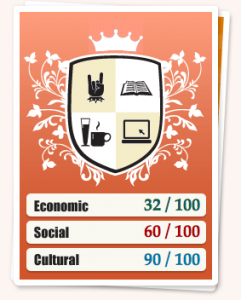
Step aside, Downton Abbey, the British social hierarchy is astir again. The BBC Lab UK, with Manchester University’s Fiona Devine and Mike Savage from the London School of Economics, has conducted a class study of more than 161,000 people: the Great British Class Survey. In addition to studying each individual’s economic capital, the researchers also looked at respondents’ social capital (their social status and connections) and cultural capital (the nature and extent of their cultural interests and activities). According to Devine, this extensive survey allowed for “a much more complete picture of class in modern Britain” than previous work has captured.
The team’s results found that the traditional model of class was losing its relevance, with only 39% fitting into the working, middle, or upper class. According to the BBC, the team proposes “a new model of seven social classes ranging from the elite at the top to a ‘precariat’—the poor, precarious proletariat—at the bottom.”
The researchers believe the working and middle classes have waned because of the rise of the information age:
They say the new affluent workers and emergent service workers appear to be the children of the ‘traditional working class,’ which they say has been fragmented by de-industrialisation, mass unemployment, immigration and the restructuring of urban space.
In other words, information-age Britons don’t fit into industrial class structures. The people aren’t obsolete, but the categories may be.

Comments 1
Chris Uggen — April 9, 2013
This reminds me of Erik Wright's redefinition of the U.S. class structure in the 1970s and 1980s to include (or foreground) managers and supervisors. Good title on this one (and glad you resisted "the primes they are a-changin'").